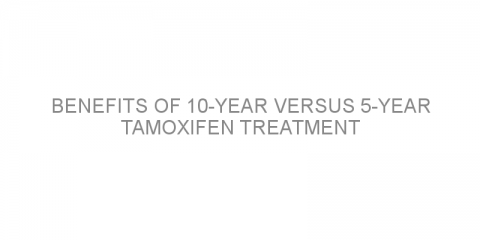In a nutshell The present study evaluated the long-term quality of life (QOL) for patients with peritoneal carcinomatosis (PC) who had cytoreductive surgery (CRS) and HIPEC (hyperthermic perioperative chemotherapy). Main findings: patients who survived the procedure regained their baseline (pre-operative) QOL within 6-12 months after...
Read MorePerformance status-2 – Symptomatic, 50 in bed Posts on Medivizor
Comparison of two surgical techniques for the treatment of pseudomyxoma peritonei
In a nutshell The present study compared the efficacy of two surgical techniques to treat pseudomyxoma peritonei (PMP): debulking and cytoreduction. Cytoreductive surgery achieved better surgical results and yielded higher 3- and 5-year survival rates, compared with debulking. Some background PMP is a rare condition caused by the production of...
Read MorePersonalized Tamoxifen Treatments
Most patients on Tamoxifen receive a standard dose of medication. However, patients may benefit more from individually adjusted doses. This paper highlights potential strategies for personalized Tamoxifen treatments. Tamoxifen is not active on its own. Once ingested, the body converts it into other substances (metabolites). Some of these...
Read MoreThe impact of radiotherapy protocol on quality of life in patients with operable rectal cancer
In a nutshell This article evaluated the long-term quality of life of patients with rectal cancer, treated with either a short course of radiation before surgery, or postoperative chemo-radiation. Patients treated with pre-operative radiation reported worse sexual- and bowel-related functional outcomes. Some background In patients with...
Read MoreTreating tumors of the appendix to reduce the risk of spread to the abdominal cavity
In a nutshell The present study classified tumors of the appendix and reviewed treatments that aim to prevent cancer spread to the abdominal cavity. Some background Pseudomyxoma peritonei (PMP) is a rare condition caused by the production of too much mucin (a protein that is secreted in mucus). PMP affects women more than men and symptoms...
Read MorePersonalizing breast cancer treatment based on the genetic “finger-print” of the tumor
This article discusses how tests such as the Oncotype DX or Mammaprint can be used to design individual treatment plans for patients with breast cancer. Patients with stage I and stage II breast cancer are treated similarly. Following surgical removal of a breast tumor, systemic (body-wide) treatment is often used. This secondary treatment is...
Read MoreBenefits of 10-year versus 5-year Tamoxifen treatment
In a nutshell Tamoxifen treatment is given to many breast cancer patients after surgery to prevent recurrences and improve survival. It is usually given for a maximum of 5 years. This study determined that longer treatments offer further survival benefit. Some background Tamoxifen is a drug used against breast cancers which produce...
Read MorePostoperative radiotherapy prevents breast cancer recurrence and prolongs survival
In a nutshell This study evaluated if strategies to prevent cancer recurrence are associated with prolonged survival 15 years after treatment. Their main findings were that postoperative radiation managed to prevent cancer recurrence and was associated with higher rates of long-term survival. Some background Early breast cancer is often treated...
Read MoreEvaluating the addition of Capecitabine to postoperative standard chemotherapy
In a nutshell This article presents summarized data from two clinical trials. The trials evaluated the addition of Capecitabine to standard postoperative chemotherapy for patients with high risk early breast cancer. Some background Capecitabine is a chemotherapy drug that is taken orally and slows the growth of tumors. It can be...
Read MoreWhat is the preferred mode of action for patients with Lobular Neoplasia: surgery or observation?
In a nutshell The present study tested whether Lobular Neoplasia (LN) diagnosed on Core Needle Biopsy (CNB) leads to breast cancer and if a selected group of patients can be safely observed rather than treated early. The main findings were that not all patients with LN diagnosed on CNB need surgery (excision). Some background Breasts are...
Read MoreComparison between laparoscopic and open surgery for colon cancer
In a nutshell The present study compares two surgical techniques for the treatment of colon cancer: Open Colectomy (OC) and Laparoscopic Assisted Colectomy (LAC). They found that LAC may be preferred to OC for removal of colon cancer. Some background The first treatment of choice for colon cancer which is localized to the colonic...
Read MorePreserving Fertility during Cancer Treatment
In a nutshell This paper reviews available options for having children after cancer treatment. The main conclusion is that sperm, egg and embryo preservation techniques can help young women have children after breast cancer treatment. Alternative options, such as ovarian tissue preservation, are also being developed. Some background...
Read More












